

 Part Four
The Dilettante
Part Four
The Dilettante

Part Four The Dilettante
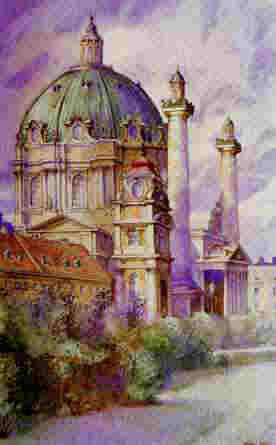
When, after the death of my mother, I went to Vienna for the third time, to remain for many years, the time which had meanwhile elapsed had restored my calm and determination. My old defiance had come back to me and my goal was now clear and definite before my eyes. I wanted to become an architect, and obstacles do not exist to be surrendered to, but only to be broken. I was determined to overcome these obstacles, keeping before my eyes the image of my father, who had started out as the child of a village shoemaker, and risen by his own efforts to be a government official. I had a better foundation to build on, and hence my possibilities in the struggle were easier, and what then seemed to be the harshness of Fate, I praise today as wisdom and Providence. While the Goddess of Suffering took me in her arms, often threatening to crush me, my will to resistance grew, and in the end this will was victorious.
The parallel Hitler draws between his own situation and that of his father 60 years earlier is interesting, but his assertion that he has a "better foundation to build on" is absurd (and the assertion that his father's father was a cobbler is inaccurate). The self-disciplined Alois had had two things going for him at eighteen; he'd completed his four-year apprenticeship in Vienna in a marketable trade, that of a cobbler, and he possessed a full measure of ambition. The self-indulgent son's assets are somewhat more difficult to quantify. He has ambition, he assures us, but he lacks anything resembling a trade. Furthermore, he makes no effort to actually receive any professional architectural training.
Alois had spent the half-decade following his eighteenth year mending shoes full-time, while systematically preparing into the wee hours for the very challenging Austrian Civil Service Exam. In contrast, Adolf, in his younger days never displays the sort of discipline required to actually complete any endeavor. He shifts rapidly from one grandiose project to the next, composing an opera one month, redesigning Vienna the next. His ability to paint a pretty picture will eventually become his trade, out of necessity; but in the meantime, he will be content to use his inheritance to fund a period of eclectic studying, reading, dreaming, and attending the opera.1
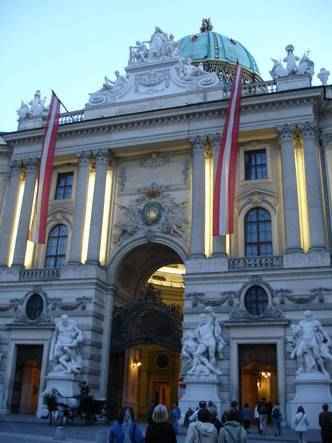
Dear Friend! Am anxiously awaiting news of your arrival. Write soon, so that I can prepare a festive welcome. The whole of Vienna awaits you. Therefore, come soon. I will, of course, meet you. The weather here is a little better. Hopefully, it will improve when you come. Also, as I have already explained, you will stay with me at first. Later we shall see what happens. You can buy a piano here at the so-called 'Dorotheum' for about 50-60 florins. Many good wishes to you and your esteemed parents from your friend.
The picture on Kubizek's postcard from Hitler is of the armor collection at the Hof Museum. It can be supposed that it was at this time that Hitler first sets eyes on the Holy Lance (Heilige Lanz) at the Hofburg Treasure House.2
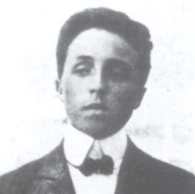
On one occasion, when he (Hitler) had once more written till all hours of the night--the ugly little smoky kerosene lamp had nearly burnt out and I was still awake--I asked him bluntly what was going to be the end of all this work. Instead of answering, he handed me a couple of hastily scribbled sheets. Astounded, I read:
Holy Mountain in the background, before it the mighty sacrificial block surrounded by huge oaks; two powerful warriors hold the black bull, which is to be sacrificed, firmly by the horns, and press the beasts mighty head against the hollow in the sacrificial block. Behind them, erect in light-colored robes, stands the priest. He holds the sword with which he will slaughter the bull. All around, solemn, bearded men, leaning on their shields, their lances ready, are watching the ceremony intently.I could not see any connection between this extraordinary description and the study of architecture, so I asked what it was supposed to be. "A play," replied Adolf. Then, in stirring words, he described the action to me. Unfortunately, I have long since forgotten it. I only remember that it was set in the Bavarian mountains at the time of the bringing of Christianity to those parts. The men who lived on the mountain did not want to accept the new faith. On the contrary! They had bound themselves by oath to kill the Christian missionaries. On this was based the conflict of the drama.
I would have liked to have asked Adolf whether his studies in the Academy left him so much free time that he could write dramas, too, but I knew how sensitive he was about everything appertaining to his chosen profession. I could appreciate his attitude, because certainly he had struggled hard enough to get his chance to study. I suppose that is what made him so touchy in this respect. But, nevertheless, there seemed to me something not quite right about it all.5
Though Adolf continues to attempt to maintain the fiction that he is taking classes at the Academy, it soon becomes obvious to Kubizek that he is not. When he brings the subject up with him, Hitler's rage is great. He rails against the "fossilized bureaucrats" holding back his genius, blaming the world for his misfortune. Henceforth, Kubizek will avoid the subject.6
His friend is, in fact, embarked upon a course of self-directed education. He consumes more time studying than that typically spent by the average full-time student. A card-carrying subscriber to the superb Hofburg Library, Hitler will spend many hours each day, and long into the night, reading. He rapidly consumes the printed page, skimming over that which he does not find useful or interesting, and absorbs that which he does, with what seems to be something approaching 100% retention. A prodigious memory is perhaps the future Fuehrer's greatest intellectual asset. He developed the capacity to recite, with precision, a vast profusion of facts and figures taken in decades earlier. Added to the continuing evolution of his ability to express himself, this will at times leave future opponents and colleagues defenseless.7
At that time I read enormously and thoroughly. All the free time my work left me was employed in my studies. In this way, I forged in a few years the foundations of a knowledge from which I still draw nourishment today. And even more than this: In this period there took shape within me a world picture and a philosophy which became the granite foundation of all my acts. In addition to what I then created, I have had to learn little; and I have had to alter nothing.
On the contrary. Today I am firmly convinced that basically and on the whole all creative ideas appear in our youth, in so far as any such are present. I distinguish between the wisdom of age, consisting solely in greater thoroughness and caution due to the experience of a long life, and the genius of youth, which pours out thoughts and ideas with inexhaustible fertility, but cannot for the moment develop them because of their very abundance. It is this youthful genius which provides the building materials and plans for the future, from which a wiser age takes the stones, carves them, and completes the edifice, in so far as the so-called wisdom of age has not stifled the genius of youth.8
Books were his whole world. In Linz, in order to procure the books he wanted, he had subscribed to three libraries. In Vienna he used the Hof Library so industriously that I asked him once, in all seriousness, whether he intended to read the whole library through, which of course earned me some rude remarks. One day he took me to the library and showed me the big reading room. I was almost overwhelmed by these enormous masses of books, and I asked him how he managed to get what he wanted. He began to explain to me the use of the catalogue, which confused me even more.
Hardly anything would disturb him when he was reading. But sometimes be disturbed himself, for as soon as he opened a book he started talking about it, and I had to listen patiently whether I was interested in the subject or not. Every now and then, in Linz even more frequently than in Vienna, he would thrust a book into my hands and demand that I, as his friend, should read it. It did not matter so much to him that I should widen my own horizon as that he should have somebody with whom he could discuss the book, even though that somebody was only a listener.
Another of Hitler's preoccupations during this period is the redesigning of Vienna, much as he had done, and will continue to do, with Linz. He creates stacks of sketches, layouts, and plans, teaching himself the rudimentary skills of architectural drafting along the way. Some of the plans and ideas generated during this period will eventually be brought to life in official Nazi buildings and monuments.
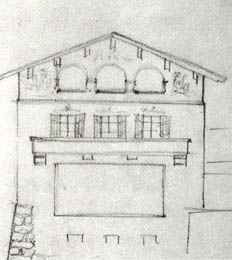
(H)e was always drawn back to inflated neo-baroque such as Kaiser Wilhelm II had also fostered, through his court architect, Ihne. Fundamentally, it was decadent baroque, comparable to the style that accompanied the decline of the Roman Empire. Thus, in the realm of architecture, as in painting and sculpture, Hitler remained arrested in the world of his youth: the world of 1880 to 1910, which stamped its imprint on his artistic taste as on his political and ideological conceptions . . . . In conferring with me over plans, Hitler perpetually drew sketches. They were casually tossed off but accurate in perspective; he drew outlines, cross sections, and renderings to scale. An architect could not have done better.9
Time not spent on eclectic intellectual pursuits is passed going to the opera, a passion shared by Hitler and Kubizek.
Kubizek the Melodramatic:When [Adolf] listened to the music of Wagner, he was transformed. His violence left him, he became quiet, submissive, and tractable. His gaze lost its restlessness, and his daily preoccupations were as though they had never been. His own destiny, however heavily it weighed upon him, no longer appeared to have any importance. He no longer felt lonely, an outlaw, a man kicked around by society. He was in a state of intoxicating ecstasy. Willingly, he allowed himself to be taken away into a legendary world more real to him than the world he saw around him every day. From the stale, musty prison of the room at the back of the courtyard, he was transported into the blessed regions of German antiquity, which for him was the ideal world, the highest goal of all his endeavors.10
While thanking you for your kind letter, I must tell you how happy I am that your dear father is coming with you to Vienna. If you and your father have no objections, I will be waiting for you at the station at 11 AM on Thursday. You write that you are having wonderful weather, and this saddens me, for if it were not raining here, we too, and not only the people of Linz, would be enjoying wonderful weather. I am delighted that you are bringing a viola. On Thursday I shall buy two Ronen's worth of cottonwool and 20 Kreuzer's worth of sticking plaster, for my ears naturally. That, on top of all this, you are growing blind, has plunged me into a profound depression: you will play even more wrong notes than before. Then you will go blind and I will eventually go deaf. Alas! Meanwhile I wish you and your esteemed parents, at least, a happy Easter, and I send them my hearty greetings, and to you, too. Your Friend.12
July 1908: Kubizek leaves Vienna to spend some time at home in Linz.13The parting was hard for both of us...Although it had not always been easy, in spite of my compliant nature, to get on with Adolf, yet our friendship had always triumphed over personal difficulties. We had known each other now for nearly four years and had got used to each other's ways. The rich treasure of artistic experiences enjoyed together in Linz, as well as the joy of lovely excursions, had been increased and deepened by our time together in Vienna...With growing maturity and discernment, my appreciation of Adolf as my friend increased, as is proved by the fact that in spite of our cramped quarters and the divergence of our interests, we had got on much better together in Vienna than in Linz. ....
So we said goodbye. Adolf assured me, for the hundredth time, how little he wanted to be left alone. I could imagine, he said, how dull it would be for him alone in the room we had shared...He accompanied me to the West Bahnhof; I stowed away my luggage and joined him on the platform. Adolf hated sentimentality of any kind. The more anything touched him, the cooler he became. So now, he just took both my hands--two hands was most unusual for him--and pressed them firmly. Then he turned and made for the exit, perhaps a little overhasty, without once turning round.
Called on Riedl (treasurer of Kubizek's musicians union) and did not find him until Thursday evening, when I was able to give him the money. My heartiest thanks for your letter and especially for the postcard. It looks very prosaic, I mean the fountain. Since you left, I have been working very industriously, often up till two or three in the morning. I will write you again when I leave.14
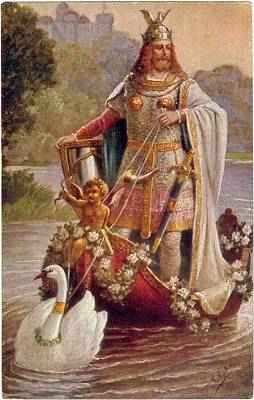
Perhaps you have wondered why I have not written for so long. The answer is very simple. I don't know what I could tell you which would especially interest you. First, I am still in Vienna and will remain here. Alone, because Frau Zakreys is staying with her brother. Nevertheless, everything goes well in my life as a recluse. There's only one thing wrong. Formerly, Frau Zakreys always knocked on my door early, so I got up and was soon at work, but now I have to rely on my own efforts.
Is there any news from Linz? Is there any news about the Society for Rebuilding the Theater? When they have finished the bank, please send me a picture postcard of it. And now I have two requests to make. First: Would you be so good as to buy for me a copy of Guide to the Danube City of Linz, not the Wohrl, but the actual Linz one published by Krakowitzer. On the cover is a picture of a girl from Linz, and in the background there is Linz seen from the Danube, with the bridge and the castle. It costs 60 Heller, which I enclose in stamps. Please send it to me immediately either postage paid, or collect. I will pay the expenses. Be sure that the timetable of the steamship company and the plan of the city are included. I need a few figures, which I have forgotten and cannot find in Wohrl.
And secondly I would be pleased if would get me a copy of the guide you had here when you next go on the steamship, and I will pay you "as you please." You will do this, won't you? I don't know anything else to say except that this morning I caught an enormous army of bugs, which were soon swimming dead in "my" blood, and now my teeth are chattering in the "heat." I believe there have been so few summers with such cold days as these. It is the same where you are, I suppose. Now with kindest regards to you and to your esteemed parents, and once more repeating my requests, I remain yr. fr.16
First I must ask your pardon for not having written for so long. There have been good or rather bad reasons for this. I simply did not know what there was to tell you. That I am now writing to you only shows how long I had to search before finding one or two bits of news. First, our landlady, Zakreys, thanks you for the money. Secondly, I want to thank you very much for your letter. Probably Zakreys has difficulty writing letters (her command of German is so weak), and she has asked me to thank you and your esteemed parents for sending the money.
I have just had a very bad attack of bronchial catarrh. It seems to me your musicians union is facing a crisis. Who actually publishes the newspaper I sent you last time? It is quite some time since I paid out the money. Do you know anything more about it? We are still enjoying very pleasant weather; it is raining heavily. And this year, with all the baking heat we have been having, that is truly a blessing from Heaven. But I shall only be able to enjoy it a little while longer. On Saturday or Sunday I shall probably have to leave. Shall give you exact details.
I am now writing rather well, usually during the afternoons and evenings. Have you read the latest decision of the City Council about the new theater? It seems to me they are going to patch up the junk heap once more. This building won't do any longer, because they won't get the permission of the authorities. Anyway, the whole wordy nonsense of these well-born and all-powerful people knows as much about building a theater as a hippopotamus knows about playing the violin. If my architecture handbook did not look so shabby, I would like to pack it up and send it to the following address: Theater-Special-committee-for-the-execution-of-the-new-building-project (Teater-Grundungsvereinentwurfsbauausfuhrungskomitesgemasser). To the well-born, tight-fisted, and worthy of the highest praise local committeemen for the eventual construction and necessary decoration!!! And now I must close. I send greetings to you and your esteemed parents and remain your friend.17
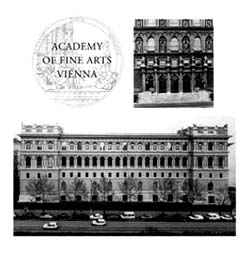
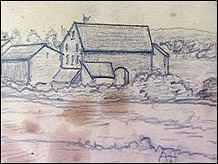
The following gentlemen performed their test drawings with insufficient success, or were not admitted to the test: 24. Adolf Hitler, Braunau a. I., Twentieth of April 1889, German Catholic. Father: civil servant. 4 Realschulein. Not admitted to the test.
Apparently, Adolf's portfolio is even less promising than his entry of the previous year, as he is not even allowed to take the test. By his own admission, his depression is enormous. His failure to be admitted to the academy proves to be such a traumatic experience for him that he cannot even face his best friend.20
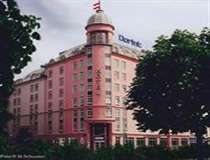
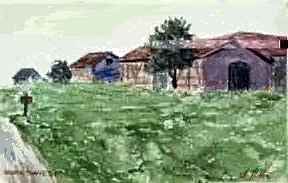
I owe it to that period that I grew hard and am still capable of being hard. And even more, I exalt it for tearing me away from the hollowness of comfortable life; for drawing the mother's darling out of his soft downy bed and giving him 'Dame Care' for a new mother; for hurling me, despite all resistance, into a world of misery and poverty, thus making me acquainted with those for whom I was later to fight.
End of Part Four.


Written by Walther Johann von Löpp Copyright © 2011-2013 All Rights Reserved Edited by Levi Bookin — Copy Editor European History and Jewish Studies






Disclaimer:The Propagander!™ includes diverse and controversial materials--such as excerpts from the writings of racists and anti-Semites--so that its readers can learn the nature and extent of hate and anti-Semitic discourse. It is our sincere belief that only the informed citizen can prevail over the ignorance of Racialist "thought." Far from approving these writings, The Propagander!™ condemns racism in all of its forms and manifestations.
Fair Use Notice: This site--The Propagander!™--may contain copyrighted material the use of which has not always been specifically authorized by the copyright owner. We are making such material available in our efforts to advance understanding of historical, political, human rights, economic, democracy, scientific, environmental, and social justice issues, etc. We believe this constitutes a "fair use" of any such copyrighted material as provided for in section 107 of the US Copyright Law. In accordance with Title 17 U.S.C. Section 107, the material on this site is distributed without profit to those who have expressed a prior interest in receiving the included information for research and educational purposes. If you wish to use copyrighted material from this site for purposes of your own that go beyond 'fair use', you must obtain permission from the copyright owner.